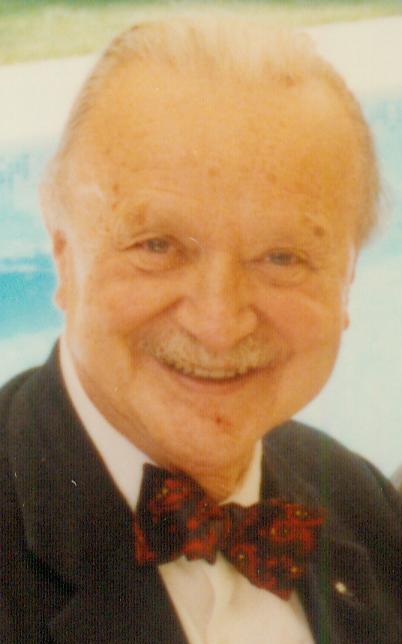Szabolcs Vajay (1921–2010) was a Hungarian historian, genealogist, heraldist, and diplomat. Vajay created an important scientific oeuvre. He dealt primarily with the medieval history of Hungarians, genealogy, and heraldry. Since 1943, his professional writings were published in 6 languages in 22 countries. He served as vice-president of the International Academy of Heraldry (1964–1976), and in 1980 he was made a professional heraldist of the Order of Malta. He was the president of the National Fellowship of Genealogist and Heraldist Associations, and he was then made an honorary president.
He was born to a Hungarian noble family in Budapest. He studied at the Szent Imre High School and then went on to study law at the university of Budapest (1939–1943). In 1942, he was made a member of the Knights Hospitallers. As a scholar, he continued his studies in Switzerland. After the putsch of the far-right Arrow Cross Party in Hungary (1944), he chose to live in exile. From 1943 until 1946, he studied at the International Affairs Department of the University of Geneva. He then became private secretary to ambassador György Barcza. In 1946, he took part in the peace negotiations as a junior diplomat. He worked for the International Red Cross and then moved to Argentina in 1948. Between 1949 and 1953, he was the managing main secretary at the Buenos Aires office of the Institute of Modern Art Foundation. He worked as a journalist in France from 1954 to 1958, and he became a cultural co-worker at Radio Free Europe in 1955. Vajay was a UNESCO official (1959–1983) responsible for the Latin American Department of the Class of Social Sciences. He took part in the organization of many higher educational institutions and contributed to the publication of Spanish and Portuguese encyclopedias and the development of scholarship networks. In 1986, he was made permanent commissioner of the International Council of Social Sciences, which operated next to the UN Center in Geneva. He led the Office of the Knights Hospitallers in Geneva. He taught at the Károli Gáspár Calvinist University and the Pázmány Péter Catholic University in Hungary.
Vajay, who believed in civil values, rejected the totalitarian regimes. As a co-worker at Radio Free Europe and a scholar of genealogy and heraldry (disciplines which were not permitted by the communist cultural authorities) he tried to preserve and pass on traditional civic values. Later, he actively took part in the Hungarian “rehabilitation” of genealogy and heraldry. He first returned to his homeland in 1971, and he regularly donated books to the National Széchényi Library. In 1978, when the U.S. government gave back the Hungarian Holy Crown at the request of the Hungarian government, Vajay became the primary expert on the committee for the study of the Crown. He was made honorary president of the recreated Society of Hungarian Genealogy and Heraldry in 1989.

